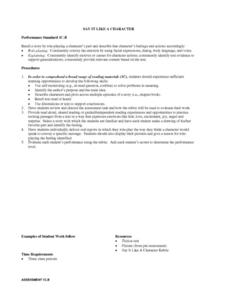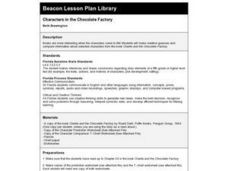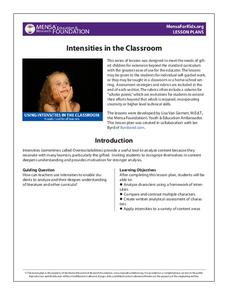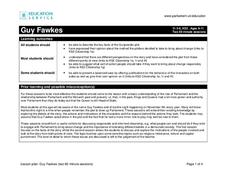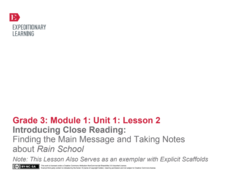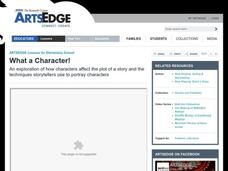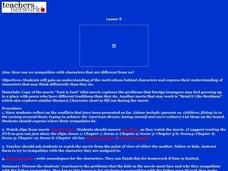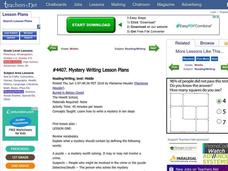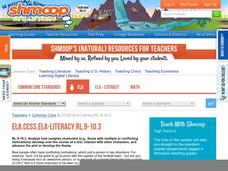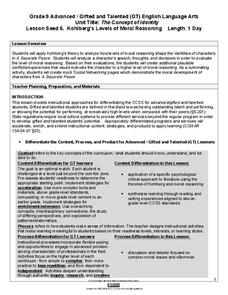Curated OER
Say It Like A Character
Middle schoolers read a story and retell it to the class by role-playing one of the characters. In groups, they use the correct facial expressions along with body language and voice to convince the others in their group that they are...
Curated OER
Michelle Kwan: Heart of a Champion
Who is a champion to your class? Elementary and middle schoolers think of a role-model from their lives. Then, in their journals, they write evidence of that person's perseverance. They identify the character trait of perseverance with...
Curated OER
The Lion, the Witch, and the Wardrobe: Graphic Organizer: Venn Diagram
Get to know more about the characters of the novel The Lion, the Witch and the Wardrobe by C.S. Lewis by comparing and contrasting their character traits using a Venn diagram.
Curated OER
Character Traits
Explore character traits using this resource. After reading the story Goldilocks and the Three Bears, learners fill in a graph identifying character traits. Then, they write and put on a skit. This resource provides a motivating way to...
Curated OER
Characters in the Chocolate Factory
Pupils dress and act as selected characters from Roald Dahl's "Charlie and the Chocolate Factory". They identify each other and make predictions about the upcoming chapters based on their observations about the characters.
Curated OER
The Cask of Amontillado
Students examine the Edgar Allan Poe story "The Cask of Amontillado." In this character lesson, students discuss and analyze the characters in the story. Students make personal connections to the characters and create a brochure...
Curated OER
Using Inspiration Software to Explore Characters In Stories
Students identify characters, their qualities, and examples of their qualities and use Inspiration to organize them in a clear and understandable format. After a lecture/demo, students use the program on the next story by themselves.
EngageNY
Close Reading of Thank You, Mr. Falker: Identifying the Superpowers of Reading
Third graders read excepts from the story, Thank You, Mr. Falker in order to gain practice in understanding an unfamiliar story by focusing on the details. They use a worksheet, embedded in the plan, which directs them to certain...
MENSA Education & Research Foundation
Intensities in the Classroom
Everyone learns and experiences life differently. A set of lessons about character intensities encourages middle and high schoolers to analyze themselves, their peers, and characters from a book based on the five listed intensities:...
Curated OER
Guy Fawkes
Sixth graders access their prior knowledge of the job of Parliament and its relationship to the monarchy. In this Gunpowder Plot lesson, 6th graders research the Gunpowder Plot, summarize key story ideas, and role play the plot. They...
EngageNY
Introducing Close Reading: Finding the Main Message and Taking Notes About Rain School
This second lesson in a larger unit is perfect for the beginning of the year because it explicitly teaches 3rd graders how to use close reading skills by identifying unfamiliar words, figuring out the gist, and defining important...
Curated OER
Helpful Animals and Compassionate Humans in Folklore
Learners define elements of stories from around the world that include helpful animals. They explore animal character motivations and use graphic organizers to compare and contrast animal stories from different cultures.
Curated OER
What a Character!
Students look at the role of characters in a story. In this character lesson, students discuss how different types of characters change the plot of the story. They see how storytellers use their body, face, and voice to tell stories.
Curated OER
Who's Got Game? The Lion or the Mouse?
Discuss bullying, folk tales, and more using this resource. Learners read the story The Lion and the Mouse by Toni and Slade Morrison, engage in cause and effect activities, make predictions, and discuss bullying. This is a motivating...
Curated OER
Saturday Market by Patricia Grossman
Readers make personal connections to Saturday Market by Patricia Grossman and answer comprehension questions while reading the book. Comparing and contrasting the different characters in a Venn diagram leads to a kinesthetic...
Curated OER
Reading and Activity Suggestions for The Adventures of Tom Sawyer
Middle schoolers learn about characterization techniques in The Adventures of Tom Sawyer. In this Adventures of Tom Sawyerinstructional activity, students write a description of one character through the eyes of another character...
TED-Ed
Pixar: The Math Behind the Movies
When will we ever use this? A Pixar movie maker explains to students how math is used in the creation of animated films. The movie maker discusses the importance of coordinate planes, transformations and translations, and...
Curated OER
Character Analysis
Learners analyze the motivations behind characters. In this character analysis instructional activity, students reflect on conflicts from previous stories and watch a clip from 'East is East.' Learners answer questions for the movie and...
Curated OER
Mystery Writing Lesson Plans
Introduce your class to the genre of mystery. Included is a vocabulary list, a rubric, and a sample mystery story called "Lethal Lesson." There are very limited directions on what to do with these resources, so you will need to plan some...
Hawaiʻi State Department of Education
Sequence of Events
Are you in need of a new way to teach learners sequence of events and how to interpret a character's external motivations? Why not engage them in dramatic play? The class will use tableaux to convey the sequence of events in a familiar...
Shmoop
ELA.CCSS.ELA-Literacy.RL.9-10.3
Focus on complex characters with a lesson from a series that teaches individual skills from the Common Core. Specifically, this resource provides practice with standard RL.9-10.3. Get pupils thinking and talking about characters with the...
Hawaiʻi State Department of Education
Crow Boy
There is a difference between actions, motives, and the appearance of a character in a narrative text. Fourth graders explore character analysis through the dramatic arts. They create a series of movements, tableaus, and pantomimes to...
Maryland Department of Education
The Concept of Identity Lesson 6: Kohlberg's Levels of Moral Reasoning
How does our moral reasoning shape our identity? After a study of Kohlberg's Levels of Moral Reasoning, readers use Kohlberg's theories to analyze the speech, thoughts, and decisions of a character in A Separate Peace. They then...
Curated OER
Alexander And The Wind-Up Mouse
Use drama techniques to recreate the story, Alexander and the Wind-Up Mouse by Leo Lionni. They engage in problem-solving as they identify the roles they will fufill in their groups for the performance. This is a motivating way to...
